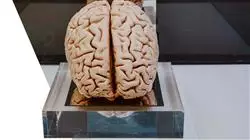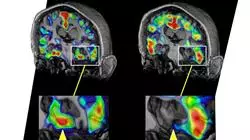University certificate
The world's largest faculty of psychology”
Introduction to the Program
Knowing in detail the latest developments in Psychoneuroimmunoendocrinology from wherever you want and with a schedule adapted to you, is at your fingertips with this 100% online program”

Despite the fact that until relatively recently everything related to the field of Psychoneuroimmunoendocrinology was unknown, continuous research and advances in science have made it possible to confirm that there is an intimate connection between the immune system, behavior, the central nervous system and the endocrine system. As a result, the idea that the immune system was self-regulating was discarded, accepting the paradigm that interactions with the rest can interfere positively and negatively with the patient's health.
The success of the therapies and treatments applied in this field with millions of patients has led to an increasing demand for professionals specialized in this area who can perfectly handle the latest and most effective techniques. For them, TECH and its team of experts have created this Postgraduate diploma in Psychoneuroimmunoendocrinology. It is a program that delves into the basics of Neuropsychology, as well as the principles of Functional Neuroanatomy. Thanks to the course of this 100% online qualification, the graduate will acquire a broad and up-to-date knowledge of the latest developments in this discipline, and will be able to implement the best strategies in the management of patients with various psychological pathologies in their professional practice.
For this purpose, a virtual classroom will be available 24 hours a day and throughout the week, which can be accessed from any device with an internet connection. In it, you will find a syllabus, designed by experts in Psychology and Immunoendocrinology, as well as complementary readings, research articles, detailed videos, dynamic summaries and images to contextualize the information and delve into each section in a personalized way.
An intensive qualification that includes, from the introduction to Neuropsychology, to the exhaustive knowledge of functional neuroanatomy"
This Postgraduate diploma in Psychoneuroimmunoendocrinology contains the most complete and up-to-date educational program on the market. The most important features include:
- The development of practical cases presented by experts in Psychology and Immunology
- The graphic, schematic, and practical contents with which they are created, provide scientific and practical information on the disciplines that are essential for professional practice
- Practical exercises where the self-assessment process can be carried out to improve learning
- Its special emphasis on innovative methodologies
- Theoretical lessons, questions to the expert, debate forums on controversial topics, and individual reflection assignments
- Content that is accessible from any fixed or portable device with an Internet connection
An intensive qualification that includes, from the introduction to Neuropsychology, to the exhaustive knowledge of functional neuroanatomy"
The program’s teaching staff includes professionals from sector who contribute their work experience to this program, as well as renowned specialists from leading societies and prestigious universities.
The multimedia content, developed with the latest educational technology, will provide the professional with situated and contextual learning, i.e., a simulated environment that will provide immersive education programmed to learn in real situations.
This program is designed around Problem-Based Learning, whereby the professional must try to solve the different professional practice situations that arise throughout the program. For this purpose, the student will be assisted by an innovative interactive video system created by renowned and experienced experts.
Are you able to recognize the main neurotransmitters and how they work? With this Postgraduate diploma, you will master the characteristics of each one of them"

You will delve into the formation of the nervous system to perfectly understand the latest developments related to electrical and chemical synapses"
Why study at TECH?
TECH is the world’s largest online university. With an impressive catalog of more than 14,000 university programs available in 11 languages, it is positioned as a leader in employability, with a 99% job placement rate. In addition, it relies on an enormous faculty of more than 6,000 professors of the highest international renown.

Study at the world's largest online university and guarantee your professional success. The future starts at TECH”
The world’s best online university according to FORBES
The prestigious Forbes magazine, specialized in business and finance, has highlighted TECH as “the world's best online university” This is what they have recently stated in an article in their digital edition in which they echo the success story of this institution, “thanks to the academic offer it provides, the selection of its teaching staff, and an innovative learning method aimed at educating the professionals of the future”
A revolutionary study method, a cutting-edge faculty and a practical focus: the key to TECH's success.
The most complete study plans on the university scene
TECH offers the most complete study plans on the university scene, with syllabuses that cover fundamental concepts and, at the same time, the main scientific advances in their specific scientific areas. In addition, these programs are continuously being updated to guarantee students the academic vanguard and the most in-demand professional skills. In this way, the university's qualifications provide its graduates with a significant advantage to propel their careers to success.
TECH offers the most comprehensive and intensive study plans on the current university scene.
A world-class teaching staff
TECH's teaching staff is made up of more than 6,000 professors with the highest international recognition. Professors, researchers and top executives of multinational companies, including Isaiah Covington, performance coach of the Boston Celtics; Magda Romanska, principal investigator at Harvard MetaLAB; Ignacio Wistumba, chairman of the department of translational molecular pathology at MD Anderson Cancer Center; and D.W. Pine, creative director of TIME magazine, among others.
Internationally renowned experts, specialized in different branches of Health, Technology, Communication and Business, form part of the TECH faculty.
A unique learning method
TECH is the first university to use Relearning in all its programs. It is the best online learning methodology, accredited with international teaching quality certifications, provided by prestigious educational agencies. In addition, this disruptive educational model is complemented with the “Case Method”, thereby setting up a unique online teaching strategy. Innovative teaching resources are also implemented, including detailed videos, infographics and interactive summaries.
TECH combines Relearning and the Case Method in all its university programs to guarantee excellent theoretical and practical learning, studying whenever and wherever you want.
The world's largest online university
TECH is the world’s largest online university. We are the largest educational institution, with the best and widest online educational catalog, one hundred percent online and covering the vast majority of areas of knowledge. We offer a large selection of our own degrees and accredited online undergraduate and postgraduate degrees. In total, more than 14,000 university degrees, in eleven different languages, make us the largest educational largest in the world.
TECH has the world's most extensive catalog of academic and official programs, available in more than 11 languages.
Google Premier Partner
The American technology giant has awarded TECH the Google Google Premier Partner badge. This award, which is only available to 3% of the world's companies, highlights the efficient, flexible and tailored experience that this university provides to students. The recognition as a Google Premier Partner not only accredits the maximum rigor, performance and investment in TECH's digital infrastructures, but also places this university as one of the world's leading technology companies.
Google has positioned TECH in the top 3% of the world's most important technology companies by awarding it its Google Premier Partner badge.
The official online university of the NBA
TECH is the official online university of the NBA. Thanks to our agreement with the biggest league in basketball, we offer our students exclusive university programs, as well as a wide variety of educational resources focused on the business of the league and other areas of the sports industry. Each program is made up of a uniquely designed syllabus and features exceptional guest hosts: professionals with a distinguished sports background who will offer their expertise on the most relevant topics.
TECH has been selected by the NBA, the world's top basketball league, as its official online university.
The top-rated university by its students
Students have positioned TECH as the world's top-rated university on the main review websites, with a highest rating of 4.9 out of 5, obtained from more than 1,000 reviews. These results consolidate TECH as the benchmark university institution at an international level, reflecting the excellence and positive impact of its educational model.” reflecting the excellence and positive impact of its educational model.”
TECH is the world’s top-rated university by its students.
Leaders in employability
TECH has managed to become the leading university in employability. 99% of its students obtain jobs in the academic field they have studied, within one year of completing any of the university's programs. A similar number achieve immediate career enhancement. All this thanks to a study methodology that bases its effectiveness on the acquisition of practical skills, which are absolutely necessary for professional development.
99% of TECH graduates find a job within a year of completing their studies.
Postgraduate Diploma in Psychoneuroimmunoendocrinology
Psychoneuroimmunoendocrinology (PNEI) is a discipline that studies the bidirectional interaction between the nervous, immune, endocrine and psychological systems, and how this interaction can affect health and disease.
PNEI argues that psychological stress can impact the response of the immune system by regulating gene expression in immune system cells and altering the anti-inflammatory and anti-infectious function of those cells. Therefore, PNEI studies the relationship between psychological stress and autoimmune diseases, infections, allergies, psychiatric disorders, cancer, among other pathologies.
The origin of PNEI is multidisciplinary, intermingling concepts from psychology, neuroscience, immunology, endocrinology, genetics and epigenetics. The study of PNEI is developed through basic and applied research, and is carried out through the use of tools such as clinical psychology, psychological assessment, neuroimaging, cytokine analysis, among other techniques.
Psychoneuroimmunoendocrinology has allowed the development of new explanatory models for a variety of biological processes and diseases, and has facilitated an integrative approach for the treatment of patients with pathologies associated with psychological stress, such as cancer, rheumatoid arthritis, and depression, among others. Through PNEI, not only the symptomatology of the disease is addressed, but also the psychological and emotional factors that may have contributed to its onset and development.







